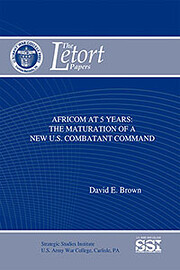

Klik op een omslag om naar Google Boeken te gaan.
|
Bezig met laden... AFRICOM at 5 Years: The Maturation of a New U.S. Combatant Commanddoor David E. Brown
Geen Bezig met laden...
Meld je aan bij LibraryThing om erachter te komen of je dit boek goed zult vinden. Op dit moment geen Discussie gesprekken over dit boek. Geen besprekingen geen besprekingen | voeg een bespreking toe
The U.S. Africa Command (AFRICOM), newest of the six U.S. Department of Defense geographic combatant commands (CCMDs), was created in 2007 amid great controversy in both Africa and the United States over its location and mission. Over the last 5 years, AFRICOM has matured greatly, overcoming much of the initial resistance from African stakeholders through careful public messaging, and by addressing most of the U.S. interagency concerns about the Command's size and proper role within the U.S. national security/foreign policy community. This Letort Paper describes the geostrategic, operational, and intellectual changes that explain why AFRICOM was created, and debunks three myths about AFRICOM: that it was created to "exploit" Africa's oil and gas riches, "blocks" China's rise in Africa, and that France "opposes" AFRICOM. The author concludes by raising five issues that are important to AFRICOM's future: 1) allocated forces to carry out short-term training engagements in Africa; 2) preference to emerging democracies in the selection of the Command's partner-nations; 3) the desirability of regional approaches in Africa, including helping the African Union and its Regional Economic Communities to establish standby brigades; 4) the location of the Command's headquarters, which should remain in Stuttgart, Germany, for operational efficiency; and, 5) the need to carry out a top-down "right-sizing" exercise at AFRICOM during a time of severe budget constraints and a real risk for the United States of "strategic insolvency." Geen bibliotheekbeschrijvingen gevonden. |
Actuele discussiesGeen
 Google Books — Bezig met laden... Google Books — Bezig met laden...GenresGeen genres LC-classificatieWaarderingGemiddelde: Geen beoordelingen.Ben jij dit?Word een LibraryThing Auteur. |
||||||||||||||||||||||||||||||||||||||||||||||||||||||||||||||||||||||||||||||||||||||||||||||||||||